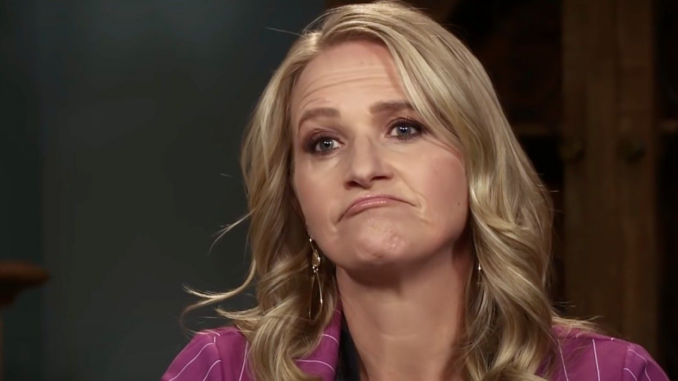
The Sister Wives series has captivated audiences for over a decade with its complex family dynamics, polygamous relationships, and intense drama. However, one of the most intriguing (and controversial) storylines in recent seasons revolves around Robyn Brown’s decision to prevent her co-wife Christine from watching her children. This seemingly small moment has sparked a significant amount of debate and speculation among fans, and it raises a few important questions about trust, jealousy, and the relationships within the Brown family.
Why would Robyn, who once appeared to have a close bond with Christine, suddenly draw such a hard line when it came to her children? What does this decision reveal about the tensions between Robyn and Christine—and how does it fit into the broader struggles within the family? In this article, we will dive deep into these questions, exploring the possible reasons behind Robyn’s actions and what they mean for the future of the Brown family dynamic.
The Complex Relationship Between Robyn and Christine
At the heart of Robyn’s decision to prevent Christine from watching her kids lies the evolving relationship between the two wives. Initially, Robyn and Christine appeared to get along relatively well, often sharing moments of camaraderie and mutual understanding. Both were respectful of each other’s roles in the family, and they seemed to have a working relationship that benefited both of them.
However, as time went on, cracks began to show in their connection. Christine’s feelings of frustration with Kody and the family dynamic began to escalate, and Robyn’s increasing closeness to Kody only intensified the tension. As Kody’s favoritism toward Robyn became more apparent, Christine’s discomfort grew, and the friendship between the two women began to fray.
Christine’s departure from Kody, after years of unhappiness, marked a pivotal shift in their relationship. The bond between Robyn and Christine became more strained as the realities of living in a plural family became harder to ignore. Robyn’s decision to prevent Christine from watching her kids may have been a reflection of this deepening divide.
A Growing Tension Between Kody’s Wives
Kody Brown’s favoritism toward Robyn has been a recurring theme on Sister Wives. This favoritism, while not always explicitly acknowledged, has contributed to a lot of the tension between Kody and his other wives. As Kody became increasingly emotionally dependent on Robyn, the other wives began to feel neglected and sidelined. This growing divide created a hostile atmosphere within the family, which only worsened as Christine’s unhappiness became more visible.
Christine, who had always been vocal about her frustrations with Kody, began to feel even more isolated. With Robyn appearing to be Kody’s “go-to” wife, Christine’s emotional needs were often left unmet. This dynamic could have been a factor in Robyn’s decision to keep Christine at arm’s length, particularly when it came to something as intimate as watching her children.
Why Trust Became an Issue: The Role of Robyn’s Children
Robyn’s children, particularly those from her previous marriages, have been a point of contention in the Brown family for years. Kody legally adopted Robyn’s three children, which, in many ways, placed them in a unique position within the family. They were the only biological children of Kody that he shared legal parental rights with, which gave them a level of priority and protection in the eyes of both Robyn and Kody.
Given this context, it’s easy to understand why Robyn might be more protective of her children and wary about leaving them in the care of another wife. Christine, who had her own children with Kody, might not have had the same connection or trust when it came to Robyn’s kids. The emotional stakes were high—especially with the complicated relationships already in play between the wives.
In Robyn’s mind, trusting Christine with her children could have felt like a risk. As her bond with Kody deepened and tensions with Christine grew, it may have been difficult for Robyn to shake the feeling that Christine’s presence in her life was increasingly precarious. This fear of emotional betrayal could have extended to how she perceived the potential for Christine to care for her children.

The Impact of Christine’s Departure on Robyn’s Actions
When Christine decided to leave Kody, it was a watershed moment for the family. Her departure sent shockwaves through the entire Brown family dynamic, signaling a shift in the balance of power between the wives. While Robyn may have played a part in the fractures within the family, her reaction to Christine’s exit suggests that she wasn’t necessarily the villain in the breakdown of the family unit. However, it also highlighted her increased role in the family’s decision-making process.
With Christine no longer a part of the household, Robyn may have felt an even stronger sense of responsibility toward maintaining the family’s image, as well as her children’s well-being. By preventing Christine from watching her kids, Robyn may have been attempting to assert control over a family dynamic that was quickly falling apart. As a result, her actions likely reflected the emotional strain of watching her family’s unity slip away while also trying to protect her children from potential fallout.
Robyn’s Parental Instincts and the Need for Control
One of the underlying factors behind Robyn’s actions is her natural instinct to protect her children. Parenting is already a complex and emotional journey, but in a plural family, it becomes even more difficult to navigate. Robyn likely felt a deep need to ensure her children were shielded from the drama and dysfunction unfolding within the family.
In this environment, trust becomes a critical issue. Robyn may have struggled to trust Christine to watch her kids, not because she doubted Christine’s abilities as a mother, but because she had concerns about the emotional toll the situation was having on the entire family. Robyn’s protective instincts may have kicked in, causing her to make decisions that prioritized her children’s safety and emotional well-being over other concerns.
Is Robyn’s Decision a Sign of Jealousy or Protection?
Another question that arises from Robyn’s decision to prevent Christine from watching her children is whether this move was rooted in jealousy. Could Robyn’s actions be driven by a desire to keep her children—and by extension, Kody—closer to her, especially as her bond with him continued to deepen? Alternatively, could it be a defensive reaction to the mounting tensions with Christine?
It’s likely a mix of both emotions. While Robyn’s actions can be seen as protective, they also reveal how deeply insecure she may have felt about her place within the family. The emotional complexity of polygamous relationships often breeds feelings of competition and jealousy. Robyn’s refusal to let Christine watch her kids may have been a way to assert her authority within the family and reinforce her role as Kody’s primary wife.
How Robyn’s Actions Reflect Larger Family Struggles
Robyn’s decision to prevent Christine from watching her children also highlights the larger issues at play within the Brown family. The relationships between the wives have always been strained to some extent, but with each passing season, these tensions have only grown. Robyn’s actions can be seen as a symptom of a much deeper problem—a lack of communication, trust, and understanding within the family.
The Brown family’s struggles are not unique to them. Many families, whether in monogamous or polygamous arrangements, face challenges of trust, jealousy, and emotional neglect. However, in the case of Sister Wives, these issues are magnified by the complexities of polygamy. Robyn’s decision to keep Christine away from her children is just one example of how these deeper issues have begun to surface in increasingly dramatic ways.
Conclusion: Trust and Boundaries in Polygamy
Robyn Brown’s decision to prevent Christine from watching her children reveals just how fragile the relationships within the Brown family have become. While the reasons behind Robyn’s actions are complex—ranging from a desire to protect her children to a deeper emotional divide with Christine—it’s clear that trust is at the core of these issues. In polygamous families, where emotions are often entangled with issues of favoritism, jealousy, and competition, these boundaries can be difficult to navigate.
Ultimately, Robyn’s refusal to let Christine watch her kids is a reflection of the deep-rooted emotional struggles that have plagued the Brown family. Whether or not this decision will have lasting repercussions for their relationships remains to be seen, but it’s clear that trust, communication, and mutual respect will be key to healing the divisions within the family.
FAQs
1. Why did Robyn Brown refuse Christine from watching her kids?
Robyn likely felt that the emotional dynamics within the family, combined with growing tension between her and Christine, made it difficult to trust Christine with her children.
2. Did Robyn’s actions reflect jealousy?
While Robyn’s actions may have had a degree of jealousy involved, they were likely driven more by a desire to protect her children and maintain control in a fractured family dynamic.
3. How did Kody’s favoritism impact Robyn’s decision?
Kody’s favoritism toward Robyn likely made her more protective of her role in the family and her children, which may have led to her decision to keep Christine at a distance.
4. Was this decision a turning point for Christine’s relationship with the family?
It certainly highlighted the increasing strain between Christine and the rest of the family, particularly Robyn. This could have contributed to her eventual decision to leave.
5. How does Robyn’s parenting differ from the other wives?
Robyn’s parenting is often more protective and cautious, particularly when it comes to her children. This could be influenced by her desire to maintain control and protect her children from the emotional fallout within the family.
